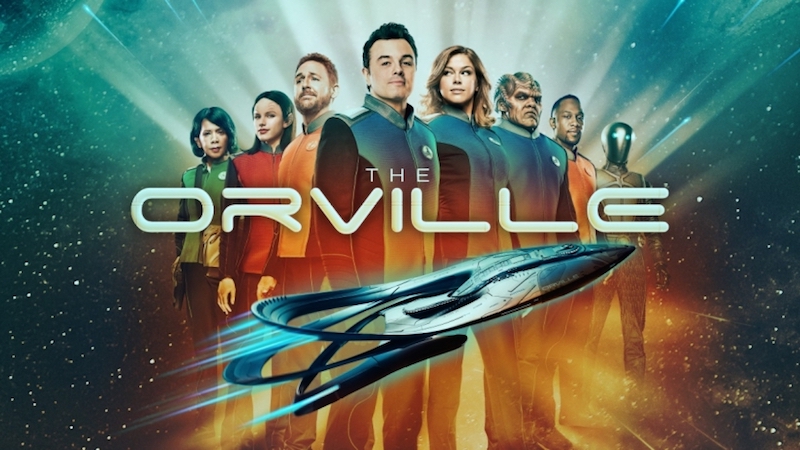The Orville: Is Religion Dangerous? (Is Religion a Force for Good?)
Episode #8 of the course Sci-Phi: Philosophy through science fiction by David Kyle Johnson, PhD
Although people expected Seth MacFarlane’s sci-fi show, The Orville, to just be “Star Trek meets Spaceballs,” it turned out to be much more like “Star Trek meets M*A*S*H.” It will make you laugh for sure, but it’s a real show—set in a believable world, with sympathetic characters, swept up in interesting stories that tackle real world social and philosophical issues.
In the third episode, for example, a female baby is born to a couple from an all-male species. When the ship’s doctor, Finn, refuses to do the requested gender reassignment surgery, a trial ensues that raises questions about the fluidity of gender, moral relativism, and how far tolerance for other cultures should go. And when one of the couple admits to having also been born female, it makes one wonder whether their species really is all-male—or whether a social taboo against females in their society causes all couples to secretly change the gender of their daughters.
The Krill
The philosophical depth continues throughout the first season. Take the Krill, for example, an alien species that became more (instead of less) religious as it advanced technologically. As a result, the Krill see other species as “soulless,” and they wipe out Planetary Union colonies for their resources without remorse, as if they have a divine mandate. The Planetary Union worries that attempting to stop them will likely spark a long-lasting holy war.
This raises serious questions about the dangers of religion, because the similarities to real-world past religious atrocities are obvious. It harkens to “manifest destiny,” the Christian European belief that they had a divine mandate to take the Americas, which led to untold suffering among millions of its native inhabitants. Likewise, it reminds us of the belief that other races are soulless, which Christians used to justify everything from slavery to the Holocaust. And then, of course, there are the Holy Wars—like the medieval crusades and the modern jihads of Al Qaeda and ISIS.
“Mad Idolatry”
Similar worries are raised in “Mad Idolatry,” where first officer Kelly Grayson accidentally creates a religion that worships her on a primitive planet. Because the planet phases in and out of our universe, the crew watches the religion develop over hundreds of years. In her name, Kelly sees people frightened, tortured, hung … all because they “denied the word of Kelly.” Kelly tries to undo the damage, but by the equivalent of the 21st century, mega-churches-of-Kelly are bilking people out of money, holding back education, and religious wars are being waged.
In the end, the planet’s society turns out fine, but not because of its religion—despite it. Its embracing of religion is depicted as a necessary “growing pain” that would have just found another face had it not been for Kelly’s interference. And the society eventually trades religion for “faith in reason, in discovery, and … the endurance of the logical mind” and flourishes into a peaceful space-faring society. The message is clear: Religion may be “a part of every culture’s evolution,” but we must eventually abandon it for reason if we are to survive and advance.
Old Wounds
This is a message that would be embraced by thinkers like Christopher Hitchens, who encouraged people to abandon religion for the good of society. Promoting credulity, female genital mutilation, honor killings, child molestation, the subjugation of women, witch hunts, Islamic terrorism in the Middle East, Christian terrorism in the US, abortion clinic bombings, restrictions of basic rights and education, the execution of homosexuals, deadly exorcisms, the denial of climate change produced by global warming—these are all things being done in the name of religion, in the real world, right now. If we aren’t careful, Hitchens might argue, we could end up like the Krill.
Philosopher Daniel Dennett has argued that religion should be studied scientifically. Correspondingly, he would likely suggest that whether religion is a net good for the world is a question that can and should be studied empirically. Sure, it’s done good things too—but has it done more harm than good? Sure, it’s provided social stability, charity for the poor, and health care—but aren’t those things now provided (much more reliably) by the state? Indeed, according to the 2015 World Happiness Report, by all objective measures, like life-satisfaction and access to health care, the more religious a society is, the worse off its members are.
This certainly doesn’t settle the issue, but one can see why people like Hitchens think it’s time for humanity to abandon religion. If we don’t end up like the Krill, we might end up living in a society like the one described in the next bit of science fiction I want to discuss: The Handmaid’s Tale.
Recommended reading
“Report: World’s Happiest Countries Are Least Religious” by Michael Stone
Recommended books
Breaking the Spell by Daniel Dennett
God Is Not Great by Christopher Hitchens
Share with friends

